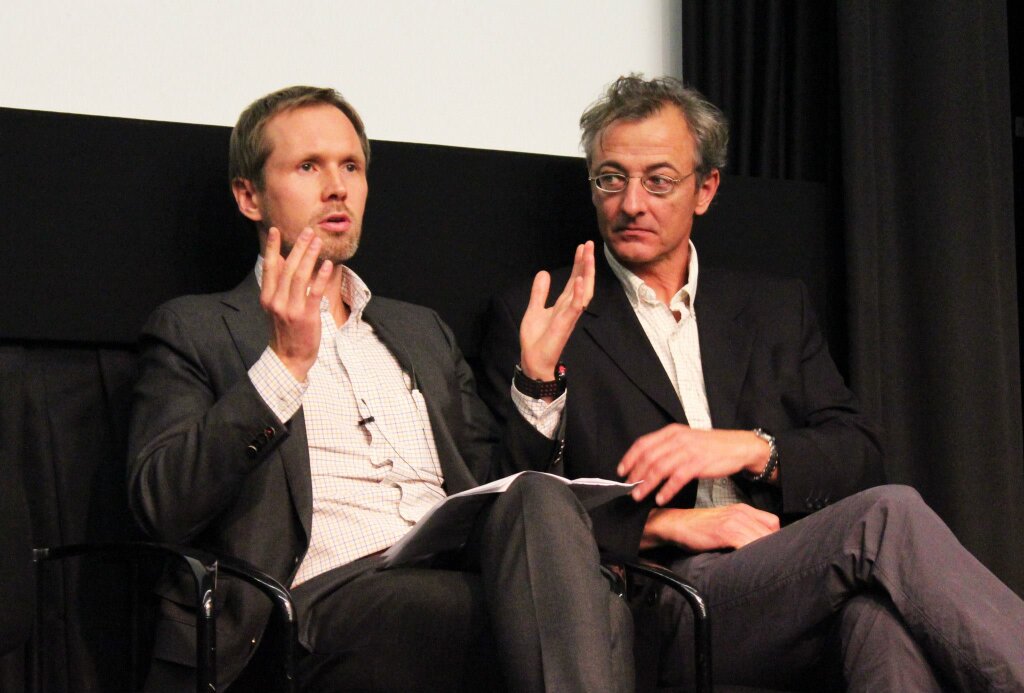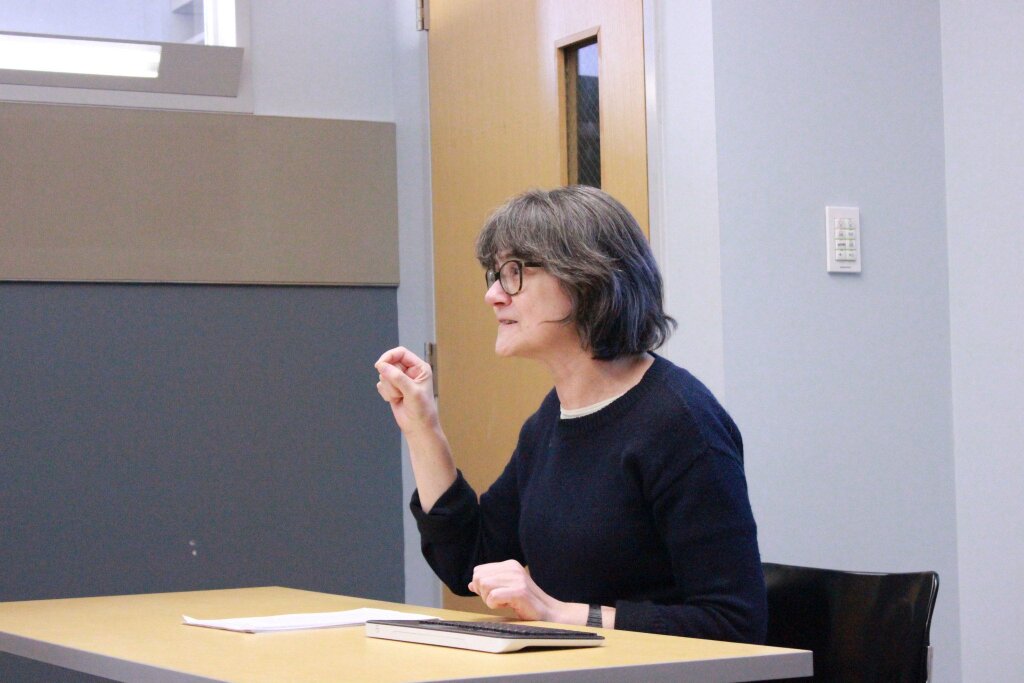Watch the video of the event here
On December 1st, 2014, the Jordan Center and the Carnegie Council for Ethics and International Relationships organized a panel entitled “Russia in the Global Context.” The purpose of the event, as Director of Jordan Center – Yanni Kotsonis – pointed out, was to bring together different perspectives and opinions on Russia’s role in contemporary international politics. Director of the Carnegie Council for Ethics and International Affairs – David Speedie – added that after working on Russian-American relations for many years, he still believes it to be one of, of not the most important international relation. All three panelists dedicated their presentations to Russia’s involvement in the recent politics in Ukraine. While providing different perspectives on this issue, each presentation pointed to the unresolved differences in values and interests between Russia and the West, which has contributed to their deteriorating relations and communication. In addition, the problem of Western and Russian unpreparedness to economically support Ukraine and its reconstruction poses one of the greatest challenges to the resolution of the conflict.
The first presenter was Nicolai Petro, a Professor of Political Science at the University of Rhode Island. He began his talk by siding with the opinion of several former ambassadors to Russia that “the conflict in Ukraine is a conflict of indigenous communities that have a very different idea of what it means to be Ukrainian. It is a war over Ukrainian identity.” For western Ukrainians, “being Ukrainian means suppressing Russian culture.” For the Russophone regions of Ukraine, being a Ukrainian means “being a distinct nation, which is still very close to Russia.” Ultimately, the conflict in Ukraine poses a question of whether Ukraine should be a monocultural or a plurocultural nation.
“Why did this conflict explode now?” Petro asked. Since the fall of the Soviet Union, these two regional identities “managed a tense coexistence.” The gridlock that ensued prevented reforms, but “it was also a way to avoid civil war,” Petro asserted. The ousting of President Yanukovich was seen by the Russophone Ukrainians as a violation of the delicate political balance that was upheld for more than two decades. Two thirds of the Donbass region saw the Maidan as a forceful violation of law. In Kharkov, many voted for an establishment of a regional government until constitutional order was restored in Kiev. The Crimea went even further and called for a referendum for its autonomy within Ukraine.
Petro then outlined the various responses by Russia to these events in Ukraine’s eastern regions. “I do not believe that Russia’s strategy is to destabilize Ukraine,” Petro asserted. He added that Russia is already struggling with half a million refuges. Further destabilization will result in more refugees and further economic collapse. In Petro’s view, Russia wants a stable Ukraine that could repay its 30 billion dollar debt it owes to Russia; but Russia strongly disagrees with the West on how to stabilize Ukraine. Petro claimed that the West does not see the importance of cultural differences in Ukraine; it believes that the washing away of corruption in the country will increase its economic stability and subsequently wash away the cultural differences and disagreements. By contrast, Russia sees Ukraine as a culturally fragmented society, in which corruption feeds on these instabilities. Stability, then “will depend on the legitimation of these cultural differences.”
These irreconcilable perspectives on Ukraine lead to two opposing solutions, Petro continued. The preferred Russian solution is to establish a “plurocultural Ukraine,” in which all Ukrainian minorities are given equal rights. The second solution is one preferred by the West, which Petro referred to as the “homogeneous Ukraine,” in which minorities are given a subordinate status. This solution, gained a new lease on life since the referendum in the Crimea and the eastern regions of Ukraine have lost their economic and political power. In order for the “monocultural Ukraine” to succeed, many intellectuals believe that the Russian speakers in Ukraine will need to be educated in their Ukrainian identity, a process that another scholar referred to as “peaceful colonialism.” “This will result in an illiberal democracy,” Petro concluded, because the new Ukrainian government will have to ensure military presence in the East.
The Western interest in Ukraine is two-fold, Petro continued. First, achieving a viable Ukraine. Second, removing it as a source of geo-politic contention. “Currently, our policy fails on both accounts.” Petro believes that the only way out of the crisis is though pulling together economic sources of Russia, the EU, and the United States in order to reconstruct Ukraine – a plan that unfortunately has no chance of being implemented.
The next speaker on the panel was Arturas Rozenas of the Politics Department at NYU. With regard to the Russian position on the world stage, Rozenas claimed that the recent G20 meeting is the best testimony to the crisis of the current situation. “You have to be doing something wrong if 19 out of 20 leaders are reacting to you,” Rozenas stated. “It is very unfortunate that Russia is a country that wants to be respected but it is not respected.” While it is feared by some, it is not respected and finds itself in political and economic isolation. Even those courtiers who supported Russia on its annexation of Crimea, like Cuba, Syria, and Nicaragua, supported Russia not because they agreed with its politics, but because of their costly economic alliances with Russia.
Rozenas continued by stating that Putin’s rule inside the country presents a different picture. At the present moment, “Russia is a dictatorial welfare state.” In the past, Putin’s popular support always went hand in hand with economic performance. As Russia is experiencing its economic decline, Putin’s support is now shifting from the economic to the military sphere. His success is now dependent on the mechanisms of the secret police and military apparatus, a time, as Rozenas explained, when a dictator is most susceptible to experiencing a coup d’état. In this situation, a leader is most likely to increase salaries to the military men rather than doctors.
Finally, Rozenas brought up his concerns in regards to various responses to Russia’s political actions. The first response that Rozenas finds troubling, is expressed by the non-repressed intelligentsia in Russia. They believe that the political events in Ukraine was a provocation by the West and that the West should have known how Russia would respond. This argument, Rozenas believes is neither morally nor legally appealing. The second faulty response to Russia’s role in the Ukrainian crisis is the belief that shaming Russia enough would make it change its course of action; its value lies in believing that countries have a tendency to keep promises and agreements. “Talk is cheap. Actions are really expensive. This is what we should really focus on.” Rozenas concluded his talk by stating that it is in the interests of the West to respond to what is happening as strongly as it can.
The final presenter on the panel is a partner a Kissinger Associates and a former advisor to President George W. Bush on US-Russia relations. He stated that for the past several months, various solutions have been brought forth on the question of Ukrainian crisis. Some included a destabilization in Ukraine, assurance of rights to Russian citizens and Russian speakers, agreement on a large economic package that would include the US, Russia, and EU to help Ukraine. “But what we find frustrating in Europe and US is that Moscow is resistant to outline the details of the solution plan.”
Graham added: “A question arises in my mind is to what Moscow’s real goal in Ukraine is. […] Have they changed as the crisis unfolded? […] Are they larger or smaller? How are we going to carry out the negotiations?” Graham believes that Russia needs to negotiate with Ukraine; ultimately, it is the Ukrainians and Russians who will have to work out their conflicts and come up with sustainable solutions.
With regard to the West and Russia, Graham stated that neither side is prepared to take the first step in de-escalating this crisis. “Moscow wants the sanctions lifted. The West wants Moscow to change its behavior first before it will lift any sanctions.” Graham continued to say that despite many critics suggesting that we are experiencing the return of the Cold War, this is not so. “But in some way, the situation is even more dangerous than during the Cold War.” The problem today, Graham asserted, is that the West and Russia cannot even agree on some of the basic facts about what is happening on the ground. For example, in discussing whether there are Russian troops on Ukrainian soil, Russia says no, while the West says yes. Both sides don’t want to face up to the reality because it complicates the position that they want to take publically and with their allies. “We don’t talk to each other any longer,” Graham concluded, “instead of working through problems, we have a break-down in communication.”
In the discussion that followed the three presentations, Petro stated that he would disagree with the notion that the Ukrainian society was at peace from 1991 until now. “I don’t think many are surprised with this outcome. It was destined to happen,” he asserted. “I ask those who say that this is an issue of international law: ‘What do we do with the people who live there?’ […] If you magically return the Crimea to Ukraine, it would start the same issues all over again.” Graham agreed with Petro that this was a problem waiting to happen. Even in the properly conducted referendum, the vote would still have been pro-independence. “How do we make this referendum seen as a legitimate reflection of the people’s will?” he wondered.
Joshua Tucker, a Professor of Politics at NYU, asked whether it is possible that we understand Putin’s intentions and motivations wrongly. After all, if Russia’s goal was to keep Ukraine out of the orbit of the West, the result was just the opposite. Was this a story of international security concerns or Russian’s internal politics? Petro replied that this could be interpreted as Russia’s miscalculation. Another explanation could be that this was not done through Putin’s initiative alone. Rozenas also suggested that we have to stop thinking of Russia as a unitary state. Ukraine was the success not of Putin alone, but of the people in charge of military decisions.



